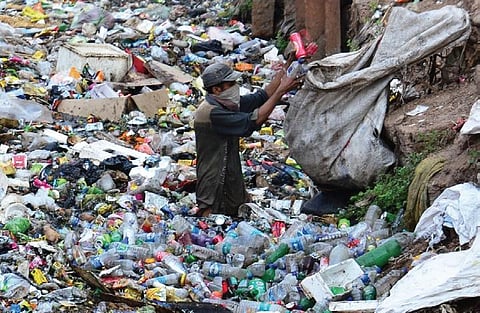

World Environment Day this year focuses on global solutions to beat plastic pollution and transition to a circular plastics economy. Plastics are unique materials, and their use in various critical applications is essential. However, managing plastic waste has become a massive challenge due to its wide-ranging uses and low awareness of management options. OECD data suggests that only around 9% of plastic is recycled globally, and almost half is landfilled. This presents a huge opportunity to work on better systems for collecting and managing plastic waste.
Plastics were much in focus in 2022. Heads of State, Ministers of Environment and other representatives from UN Member States endorsed a historic resolution at the UN Environment Assembly (UNEA-5) in Nairobi to End Plastic Pollution and forge an international legally binding agreement by 2024. The resolution addressed the full lifecycle of plastic, including its production, design, and disposal. Since 2022, the Intergovernmental Negotiating Committee has met twice, in Uruguay and, most recently, Paris. It is heartening to note that India has participated actively in these sessions.
In India, the action on plastic waste started with the government banning single-use plastics in 2019 and the Ministry of Environment, Forest and Climate Change naming the 18 plastic articles included.
The on-ground Swachch Bharat Mission (SBM) was launched in October 2014 to manage 100% of solid waste scientifically. It is being implemented with resolve, and progress is monitored, measured and results placed in the public domain. SBM 2.0, launched in 2021, also emphasises the need for plastic management – working towards minimising single-use plastic and operationalising recycling and reuse through processing. This complements the essence of the Lifestyle for Environment (LiFE) Mission, announced at COP 26 in Glasgow by the Prime Minister. LiFE Mission stresses individual action intended to ripple out to the national level. It is a public movement to mobilise individuals to become Pro-Planet People.
The key challenges in India concerning plastic waste management are littering, segregation at source and lack of infrastructure for subsequent management. In India, with a vast geographic spread and large diversity in cultures, traditions, and socio-economic factors, driving behavioural change is challenging. Particularly in the case of plastic waste, it is tough to motivate changes in habits and inculcate all-important segregation at source. But the above also presents a huge opportunity in terms of creating livelihood and the creation of a huge waste management sector.
Policy drivers in the form of the Extended Producer Responsibility (EPR) Guidelines for plastic packaging, in the Plastic Waste Management (PWM) Rules, for example, have lent impetus to on-ground action and are, slowly but surely, shifting action towards circular plastic packaging. This will drive much-needed investment towards high-quality recycling. The government is rolling out EPR for many materials other than plastics, including tyres, batteries, and waste oil.
Such policy enablement can be supported and strengthened by voluntary business initiatives such as the India Plastics Pact, launched in 2021 and hosted by CII. With about fifty signatories on board, it offers a common platform for action by stakeholders across the plastics packaging value chain. Moving beyond the Government of India’s list, Pact signatories will remove 390 million unnecessary and problematic items from their packaging.
CII is clear about the scale of the opportunity made available to businesses and optimistic that the regulation will spur growth in the recycling capacity of different polymer resins. Equally, it will attract investments in infrastructure, including equipment, material recovery facilities, transport, and the upgradation of technologies for sorting, processing, and recycling waste. The latter is crucial as it will permit closed-loop recycling, thus maintaining material value at the highest level in a circular economy.
We are aware that change brings opportunity and challenge. For India’s medium, small and micro enterprises, a shift to sustainable practices also spells a large shift in the requirement of capital, workforce, technology, skills, and capacity. CII works with this sector to minimise the gaps and provide support through design guidance, for example, so that best practices are available and adopted and enterprise owners can access information.
Flexible packaging is trendy in countries similar to India in socio-economic terms. Such countries also share similarities in terms of the large-scale involvement of the informal sector in collecting and processing plastic waste material flows. This packaging presents a challenge in collection, storage, and recycling. Despite its versatility, it warrants special attention. However, it also allows popular food and non-food products to be sold at price points that are affordable and that are accessible to citizens in all parts of the country.
In 2018, India consumed 5.4 million metric tons (MMT) of plastics; 59% of this went into packaging (by weight), out of which 71% went into flexible packaging (by weight). However, this situation also presents a great opportunity for India to become a solution provider and develop flexible packaging whose collection is incentivised and designed for recyclability.
Overall, Indian businesses are much better informed and more inclined to act on environmental and sustainability issues than ever before. Reporting requirements such as those of the BRSR are compelling a move toward transparency and accountability. Many have R&D working to develop better, more circular plastic packaging. The government has established a strong policy: its consistent implementation will create confidence for brands, recyclers, and manufacturers to invest in better equipment and technology.
To sum it up, more than one entity is needed to solve the plastic waste management challenge. It requires collaborative action by governments, industry, civil society, and NGOs so that our future generations inherit a greener earth. On this momentous occasion, let us all pledge to continue our collective efforts towards a more sustainable future.
Chandrajit Banerjee
Director General, Confederation of Indian Industry
(cb@cii.in)